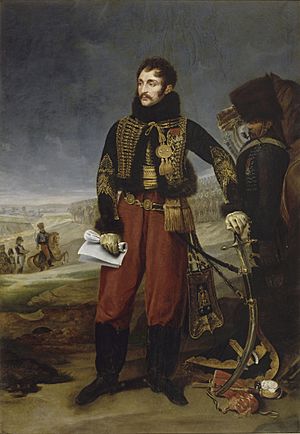Battle of Wischau facts for kids
Quick facts for kids Battle of Wischau |
|||||||
|---|---|---|---|---|---|---|---|
| Part of the War of the Third Coalition | |||||||
 Lasalle, by Antoine-Jean Gros (1808) |
|||||||
|
|||||||
| Belligerents | |||||||
| Commanders and leaders | |||||||
| Frédéric Henri Walther Antoine Charles Louis de Lasalle | Prince Pyotr Bagration | ||||||
| Strength | |||||||
| 1,400 | 24,000 | ||||||
| Casualties and losses | |||||||
| unclear, Imperial Eagle and Guidon (11th Dragoons) | unclear | ||||||
The Battle of Wischau was a small but important fight. It happened on November 25, 1805. This battle was between the Russian and French armies. The Russians won a minor victory.
This battle took place after the fighting at Hollabrun and Schöngrabern. It also happened just before the much bigger Battle of Austerlitz. The easy win at Wischau made the Third Coalition allies think. They believed the French army was tired and easy to beat. The French had traveled far and lost many soldiers in recent weeks.
Who Fought at Wischau?
The battle involved soldiers from two powerful European nations. These were the French Empire and the Russian Empire. Each side had different types of troops ready for battle.
French Army Forces
The French forces were led by General Frédéric Henri Walther and General Antoine Charles Louis de Lasalle. Their troops were mainly cavalry, which are soldiers who fight on horseback.
- They had about 1,400 soldiers in total.
- These soldiers were part of several cavalry units.
- These included the 6th and 11th Dragoons.
- They also had the 9th and 10th Hussar Regiments.
- The 22nd Chasseurs Chevalier were also present.
- The French also brought 12 cannons to the fight.
During the battle, the 11th Dragoons lost an Imperial Eagle. This was a special flag that represented their unit. They also lost a guidon, which is another type of military flag.
Russian Army Forces
The Russian army was much larger in this battle. Their main commander was Lieutenant General Pyotr Bagration. He had several other generals helping him.
- The Russian forces had about 12,000 soldiers.
- They had many infantry soldiers, who fight on foot.
- They also had a strong cavalry force.
- This included the Leib Kür Regiment and two Dragoon Regiments.
- Two Hussar Regiments, Pavlograd and Mariupol, were also there.
- Cossacks, who are skilled horsemen, also joined the fight.
- The Russians had 24 cannons, twice as many as the French.
Why Was Wischau Important?
Even though it was a small battle, Wischau had a big impact. The Russian victory made the allies too confident. They thought the French were weak and ready to surrender. This belief influenced their plans for the next major battle. That battle would be the famous Battle of Austerlitz.
 | Charles R. Drew |
 | Benjamin Banneker |
 | Jane C. Wright |
 | Roger Arliner Young |

